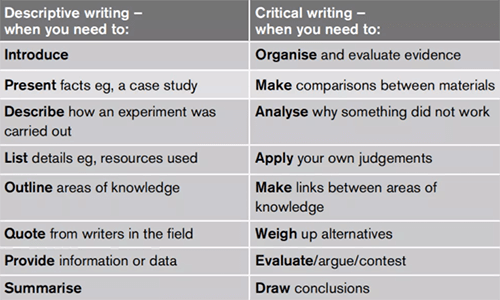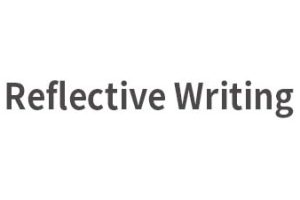Introduction
Has a tutor ever put a comment on one of your essays suggesting that your writing is too descriptive, or not critical enough? It is a very common experience, but the difference between these two kinds of writing is not always clear.

引言
导师是否曾对你的一篇文章进行过评论,认为你的写作过于描述性,或不够批判性? 这是一种很常见的经历,但这两种写作方式之间的区别却不那么清楚。
Characteristics
What is descriptive writing?
Descriptive writing is fact-based.
Examples include:
Facts and figures about a particular issue
Description of a background to a case study
Details of an organisation
An account of how research was undertaken
A summary of a sequence of events
Descriptions of what happened in an experiment.
特点
什么是描述性写作?
描述性写作是基于事实的。
示例包括:
有关某一特定问题的事实和数字
案例研究背景说明
组织的详情
关于如何进行研究的叙述
一系列事件的总结
实验中发生的事情的描述。
You will almost certainly already be expert at writing descriptively. However, sooner rather than later in your course, you may want to develop skills for writing in both descriptive and critical ways. Generally speaking, it is critical thinking and critical writing that tends to attract positive comments and higher marks from your tutors.
现在可以说你是描述性写作的专家了。然而,在你的课程中,你可能会想要同时培养描述性和批判性写作的技能。一般来说,批判性思维和批判性写作往往能从你的导师那里得到积极的评价和更高的分数。
What is critical writing?
Critical writing is more complex, and involves more discussion, analysis and evaluation than does descriptive writing.
Examples of critical writing activities include:
Engaging with evidence
Open minded and objective enquiry
Presenting reasons to dispute a particular finding
Providing an alternative approach
Recognising the limitations of evidence: either your evidence or the evidence provided by others
Thinking around a specific problem
Applying caution and humility when challenging established positions. Critical writers might tentatively suggest an independent point of view, using such phrases as It could be argued that…; or An alternative viewpoint might suggest that….
什么是批判性写作?
批判性写作比描述性写作更复杂,涉及更多的讨论、分析和评价。
批判性写作活动包括:
要添加证据
开放的思想和客观的调查
陈述对某一特定发现提出异议的理由
提供替代方法
认识到证据的局限性:无论是你的证据,还是别人提供的证据
思考特定问题
挑战现有立场时要谨慎和谦逊。批判性的作者可能会尝试性地提出一个独立的观点,使用诸如可以认为或另一种观点可能认为之类的短语。
Critical writing is an involvement in an academic debate. It requires a refusal to accept the conclusions of other writers without evaluating the arguments and evidence they provide (University of Leicester. Learning Development Centre, 2013).
批判性写作是一种学术辩论。它要求在没有评估其他作者的论点和证据的情况下拒绝接受他们的结论(莱斯特大学)。学习发展中心,2013)。
When do you use these different kinds of writing?

| 描述性写作适合: | 批判性写作适合: |
| 介绍 | 组织并评估证据 |
| 陈述事实,例如一个案例研究 | 对不同材料作出对比 |
| 描述实验是如何进行的 | 分析为什么某些事物没有作用 |
| 列出细节,例如使用的资源 | 引入你自己的判断 |
| 概述知识领域 | 在不同领域的知识之间建立联系 |
| 引用这一领域的作者的话 | 权衡不同选择 |
| 提供信息或者数据 | 评估论点或者争辩 |
| 总结 | 得出结论 |
Getting the balance right
Academic writing often requires some element of both descriptive and critical writing in the same document. The descriptive writing helps provides the structure for critical thought. It is usually the level of critical analysis in your essay that markers seek, and it is critical analysis that will gain you more marks. Consequently it is so important to be clear about the way in which the marks will be allocated.
做好平衡
学术写作通常需要在同一篇文章中同时包含一些描述性和批判性写作的元素。描述性写作有助于为批判性思维提供结构。批判性分析通常是你文章中批判性分析的水平,批判性分析会给你带来更多的分数。因此,明确分配分数的方式是非常重要的。








